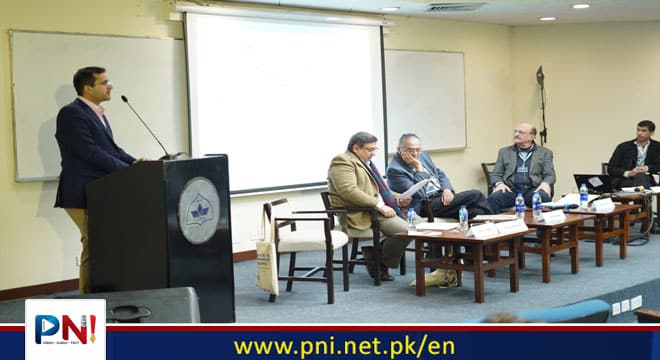LAHORE, December 22,2023: The second ‘Pathways to Development Conference’, held at LUMS from December 18 to 20, saw prominent academics, researchers, practitioners, and policymakers from within Pakistan, the Pakistani diaspora, as well as others working on Pakistan and the region gathered at LUMS to discuss issues vital to inequalities and social justice in the country. It was jointly organized by the Chaudhry Nazar Muhammad Department of Economics and the Mahbub Ul Haq Research Centre (MHRC) at LUMS, the Institute of Development & Economic Alternatives (IDEAS), the Institute of Development Studies at University of Sussex (IDS), the Consortium for Development Policy Research (CDPR), the International Growth Centre (IGC), and the Centre for Economic Research in Pakistan (CERP). Experts from across various disciplines presented their most recent research on growth and development over 20 riveting sessions.
Mr. Shahid Hussain, Rector, LUMS, along with Dr. Ali Cheema, Vice Chancellor, LUMS, officially opened the conference. They expressed pride in LUMS and its partners for leading the discourse on economic and social development through a conference that is a testament to Pakistan’s research ecosystem.
The focus of the first day was on poverty alleviation, alongside advancements in public health and education as indispensable catalysts of Pakistan’s development. Keynote speaker Dr. Stefan Dercon, Professor of Economic Policy, University of Oxford, emphasized the significance of macroeconomic stability, outward orientation, elite bargain, and stable governance in fostering Pakistan’s growth. Subsequent panel discussions included contributions from Dr. Shaheen Naseer (University of Oxford, UK); Dr. Javed Younas (American University, Sharjah); Dr. Takashi Kurosaki (Hitotsubashi University, Japan); Dr. Andreas Landmann (University of Erlangen-Nuremberg, Germany); Dr. Ryu Matsuura (Northwestern University, USA); Dr. Alexander Lee (Rochester University, USA); Dr. Farah Said (CNM Department of Economics, LUMS); and others. Dr. Ishrat Husain, Former Governor of the State Bank of Pakistan, Dr. Sadiq Ahmed (Policy Research Institute of Bangladesh), and Dr. Rakesh Mohan (Centre for Social and Economic Progress, India) came together to analyse the comparative growth trajectories of Pakistan, India, and Bangladesh. Dr. Husain summarized the key insight from his book ‘Development Pathways: India, Pakistan, and Bangladesh 1947-2022’, stating that “the consistency, continuity, and predictability of policies have led to high growth phases in these three countries.”
The second day of the conference began with a keynote address on war and revolutionary change by Dr. Steven Wilkinson, Professor of Political Science and International Affairs, Yale University. Distinguished figures including Dr. Maurizio Bussolo, Lead Economist, The World Bank; Dr. Hafiz Pasha, Dean, Beaconhouse National University; Dr. Stephen Lyon, Dean, Aga Khan University; Dr. Anjum Halai, Vice Provost, Aga Khan University; Dr. Hadia Majid, Chair, CNM Department of Economics, LUMS; Dr. Abid Burki, Professor Emeritus of Economics, LUMS; and Dr. Sher Afghan Asad, Assistant Professor of Economics, LUMS, also presented their work on pivotal themes including climate change, gender inequality and child stunting in Pakistan. The highlight of the day was an all-women panel on gender, technology and women’s empowerment in Pakistan featuring influential female leaders in their respective fields. The day concluded with the third keynote address of the conference by Dr. Amaney Jamal, Dean, School of Public and International Affairs, Princeton University. Dr. Jamal presented her research on public opinion in Palestine pre-conflict and stressed the “urgency for peace treaties and demilitarization to cease the ongoing violence in Gaza.”
The last day commenced with a keynote address on gender justice and the wellbeing economy by Dr. Naila Kabeer, Professor of Gender & Development, London School of Economics and Political Science. She spoke at length about “recognising the reproductive economy of care and capabilities, re-embedding markets, addressing gender discrimination in labour markets and democratizing governance” as key measures suggested for a feminist economy of wellbeing. This was followed by sessions on elite capture and political economy; gender and labour; and judiciary and state institutions featuring luminaries like Dr. Mahvish Shami (London School of Economics, UK), Dr. Shan Aman Rana (University of Virginia, USA), Dr. Adeel Malik (University of Oxford, UK), and Dr. Hamna Ahmed (Lahore School of Economics).
Overall, the conference sparked meaningful conversations, laying the groundwork for a growth-oriented and sustainable Pakistan. The organizers extended a heartfelt gratitude to all participants, speakers, sponsors, and media partners whose unwavering contributions were instrumental in fostering the continued success of the Pathways to Development Conference.
Follow the PNI Facebook page for the latest news and updates.









